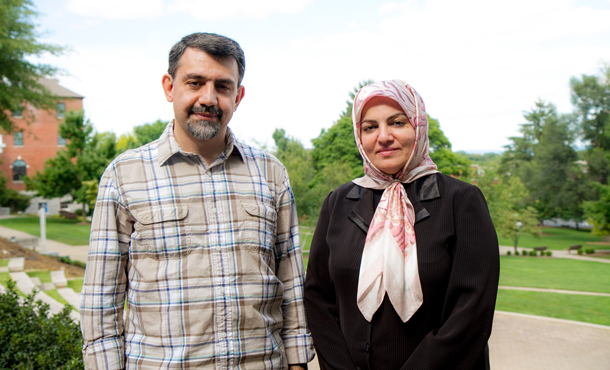The first visiting scholars at Eastern Mennonite University’s Center for Interfaith Engagement (CIE) will teach several courses on Islam and contemporary issues in Iran during the coming academic year, their first full one at EMU.
A husband-and-wife team from Tehran, Iran, Amir Akrami and Sheida Shakouri Rad are splitting a faculty position at the CIE, supported by a grant from the Henry Luce Foundation. Akrami, who holds a PhD in the philosophy of religion, will teach an “introduction to Islam” course this fall. Shakouri Rad will teach a course this fall on “women and Islam,” the topic of her doctoral dissertation.
Next spring, Akrami will teach a course called “Islamic spirituality” and co-teach a “comparative monotheisms” course, while Shakouri Rad will teach Farsi and a course on “women, politics and Islam in Iran.” The classes are open to both undergraduate and graduate students at EMU, as well as members of the public who want to audit a course.
“They are both tremendous resources for our center and the university,” says CIE Director Ed Martin, who spent years working in the Middle East with Mennonite Central Committee, first meeting Akrami about a decade ago.
In 2010, when Akrami came to Indiana for a conference at Notre Dame University, Martin helped arrange several events for him on the East Coast, including a program at EMU. Several years later, after the CIE had secured funding to hire a visiting scholar, Akrami was one of more than a dozen Islamic scholars to apply for the job. He arrived in Harrisonburg last fall and was joined by Shakouri Rad in December. (During the hiring process, Martin wasn’t aware that she was also an academic of religion, making the whole affair a surprise two-for-one deal of sorts).
Coffeehouse-style conversations on Iranian culture
In addition to their teaching, Akrami and Shakouri Rad will lead a series of monthly, informal coffeehouse-style programs on campus about Iranian life and culture, topics unfamiliar to most Americans. The first one, about the recent presidential elections in Iran, will be held at EMU’s Common Grounds coffeehouse at 7:30 p.m. on Thursday, Sept. 12.
The couple has a son in college in Montreal and a daughter studying clinical psychology at the University of Tehran, where Akrami and Shakouri Rad both earned their undergraduate and master’s degrees. Shakouri Rad says the transition from Tehran, a city with more than 8 million residents, to Harrisonburg has had it ups – plenty of peace and quiet – and downs – sort of isolated-seeming.
Since their arrival, both have enjoyed getting to know new colleagues and neighbors at EMU, as well as getting firsthand experience with Mennonite culture and faith.
Values in Valley feel similar to heart of Islam
Shakouri Rad said the commitment to simplicity, open-heartedness and compassion she’s seen since coming to Harrisonburg feels very similar to the values that lie at the heart of her Islamic faith, despite different theological and cultural expressions they’re given.
Akrami agrees, noting that the two of them have been struck by the warm welcome they’ve received at and around EMU. Exploring and understanding the core similarities between different faiths, when external ritual and tradition are pared away (e.g., how profound belief in and worship of God is reflected in daily life), Akrami says, is one of the valuable aspects of interfaith exchange.
“The specific way in which I worship God may not occur within a Christian church,” says Akrami, who has led and participated in interreligious dialogue in Iran and elsewhere for years. “But those differences don’t mean that the other traditions are deviant or out-of-line.”
He and his wife hope they are the first in a long line of visiting scholars at the Center for Interfaith Engagement.
This is just the beginning
“I hope this doesn’t end here. There should always be people from other religions here, teaching and engaging with the community,” says Shakouri Rad.
According to Martin, that is precisely the plan. The CIE is now searching for a Jewish scholar to join the faculty, and intends to keep bringing academics from different religious backgrounds to teach classes at the university.
“It’s important these days to have knowledge, understanding and be comfortable interacting with people of other faiths,” says Martin.

I FEEL VERY PROUD.